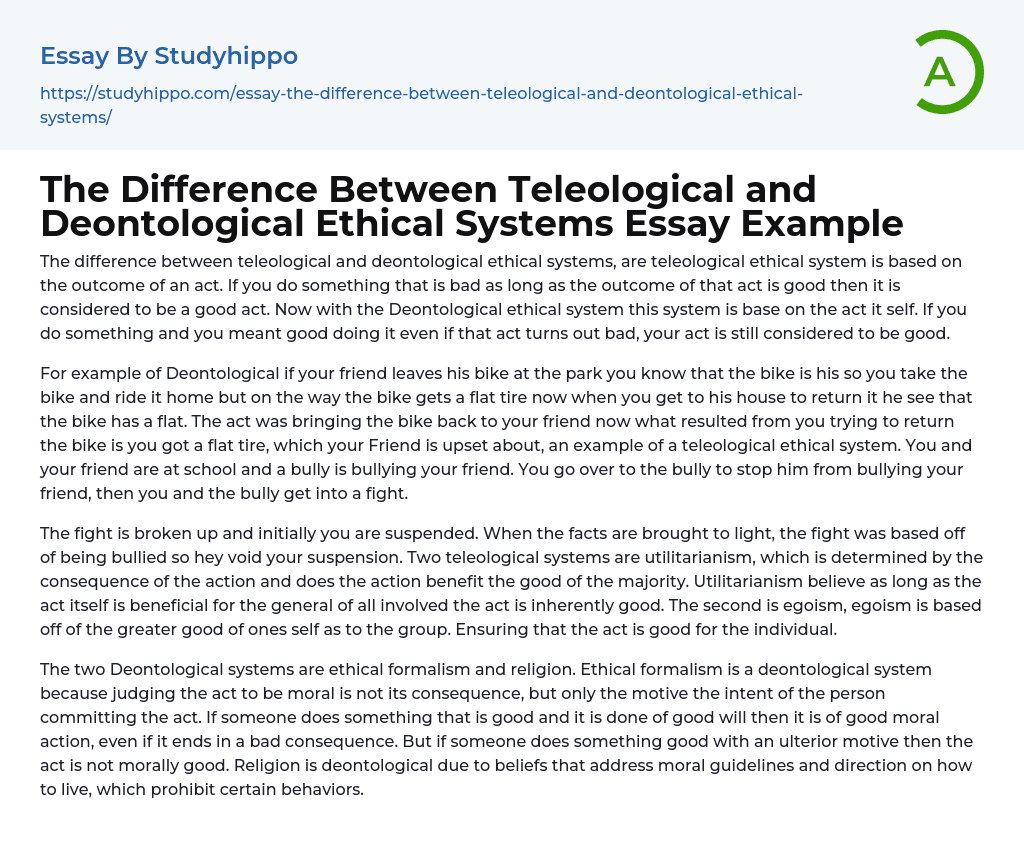

The Difference Between Teleological and Deontological Ethical Systems Essay Example
The difference between teleological and deontological ethical systems, are teleological ethical system is based on the outcome of an act. If you do something that is bad as long as the outcome of that act is good then it is considered to be a good act. Now with the Deontological ethical system this system is base on the act it self. If you do something and you meant good doing it even if that act turns out bad, your act is still considered to be good.
For example of Deontological if your friend leaves his bike at the park you know that the bike is his so you take the bike and ride it home but on the way the bike gets a flat tire now when you get to his house to return it he see that the bike has a flat. The act
...was bringing the bike back to your friend now what resulted from you trying to return the bike is you got a flat tire, which your Friend is upset about, an example of a teleological ethical system. You and your friend are at school and a bully is bullying your friend. You go over to the bully to stop him from bullying your friend, then you and the bully get into a fight.
The fight is broken up and initially you are suspended. When the facts are brought to light, the fight was based off of being bullied so hey void your suspension. Two teleological systems are utilitarianism, which is determined by the consequence of the action and does the action benefit the good of the majority. Utilitarianism believe as long a
the act itself is beneficial for the general of all involved the act is inherently good. The second is egoism, egoism is based off of the greater good of ones self as to the group. Ensuring that the act is good for the individual.
The two Deontological systems are ethical formalism and religion. Ethical formalism is a deontological system because judging the act to be moral is not its consequence, but only the motive the intent of the person committing the act. If someone does something that is good and it is done of good will then it is of good moral action, even if it ends in a bad consequence. But if someone does something good with an ulterior motive then the act is not morally good. Religion is deontological due to beliefs that address moral guidelines and direction on how to live, which prohibit certain behaviors.
- Bullying In Schools essays
- Values of Life essays
- Ethical dilemma essays
- Normative Ethics essays
- Virtue Ethics essays
- Belief essays
- Deontology essays
- Moral essays
- Virtue essays
- Work Ethic essays
- Abortion essays
- Abuse essays
- Animal Rights essays
- Animal Testing essays
- Assault essays
- Bullying essays
- Controversial Issue essays
- Crash essays
- Cyber Bullying essays
- Feminism essays
- Human Rights essays
- Immigration essays
- Inequality essays
- Poverty essays
- Prejudice essays
- Racism essays
- Torture essays
- Violence essays
- Acceptance essays
- Age Of Enlightenment essays
- Child Observation essays
- Confucianism essays
- Conscience essays
- Critical Reflection essays
- Destiny essays
- Determinism essays
- Empiricism essays
- Environmentalism essays
- Epistemology essays
- Ethics essays
- Ethos essays
- Existence essays
- Existentialism essays
- Fate essays
- Free Will essays
- Functionalism essays
- Future essays
- Good And Evil essays
- Human Nature essays
- Individualism essays



